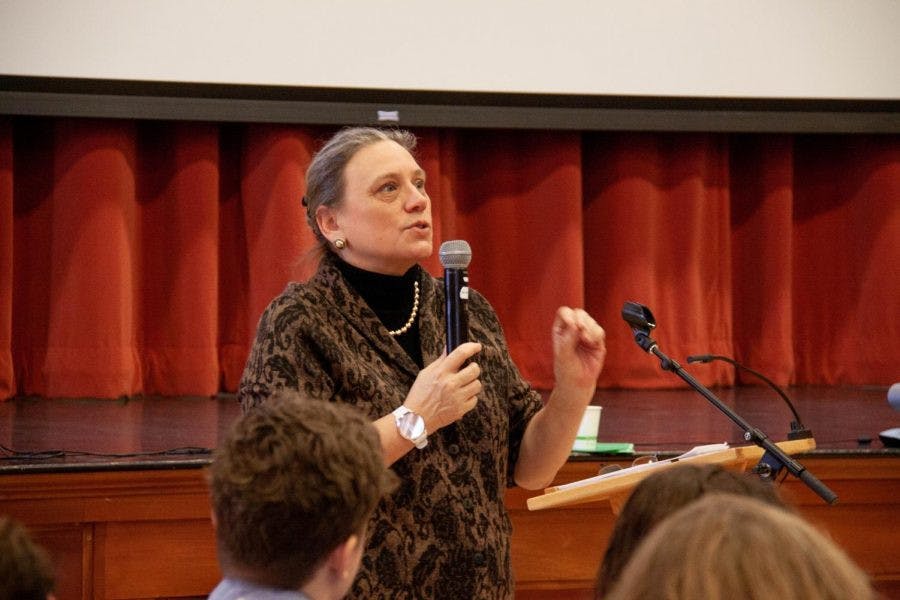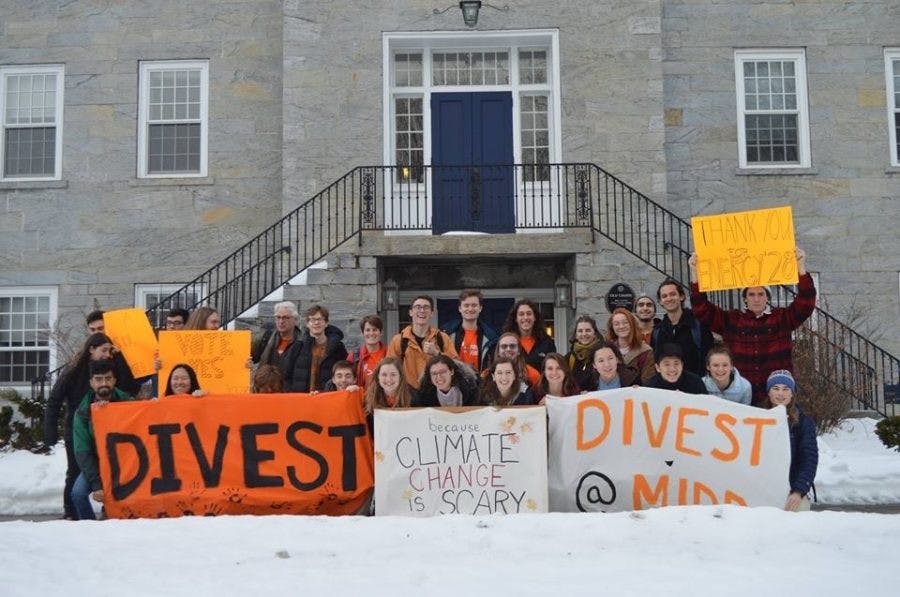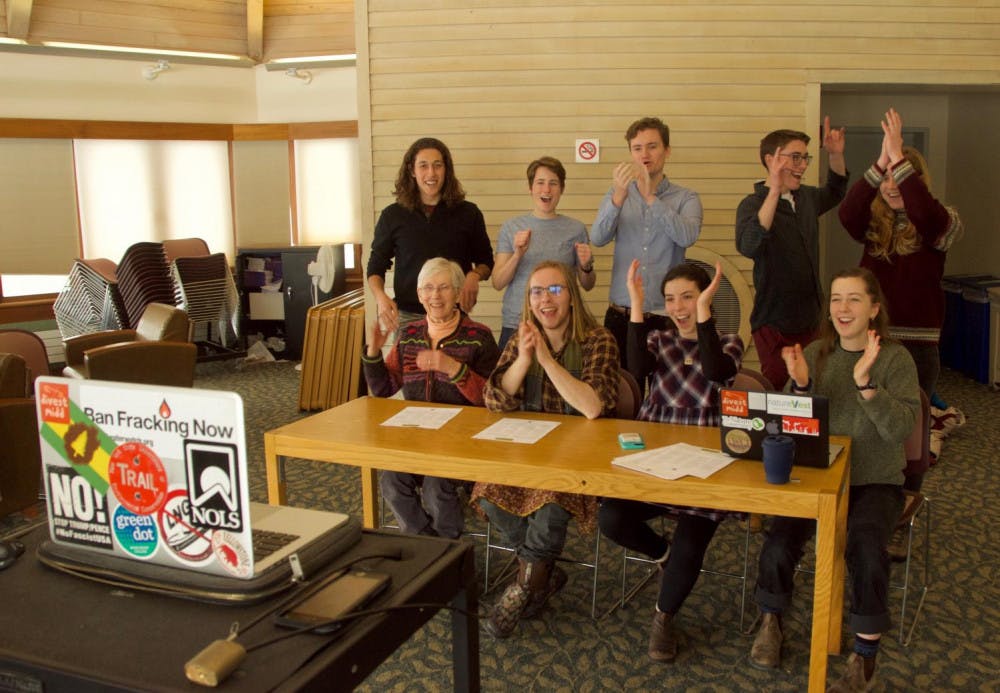The Middlebury Board of Trustees unanimously voted to divest last weekend, the culmination of a more than six-year effort by student-activists to rid the institution's endowment of investments in fossil fuels.
Divestment is one of four components of the institution’s new 10-year Energy2028 plan, which also includes a framework for committing to 100 percent renewable energy, reducing energy consumption on campus by 25 percent and expanding environmental education initiatives. President Laurie L. Patton publicly announced the plan yesterday before an energized crowd in Wilson Hall.
"I feel like everything I've learned in all of my classes at Middlebury has led up to this moment,” said Alec Fleischer ’20.5. Fleischer is a member of the student-run Sunday Night Environmental Group (SNEG) and works with Divest Middlebury, an SNEG campaign formed in 2012.

The student members and organizers of Divest Middlebury have worked tirelessly to make divestment a priority for the college since the club’s conception in 2012.
“This process has taught me how to be an activist, how to push this institution, and how to create sound environmental policy,” he said. “I'm glad to see this institution implementing the lessons it's teaching its students.”Energy2028, Patton said, is a natural progression in the college’s long history of environmental leadership, dating back to the founding of the nation’s first Environmental Studies program in 1965. Today’s announcement makes Middlebury one of the most prominent institutions to pledge full divestment from fossil fuels, and marks a new chapter in its mission to combat climate change.
The decision does not come without risk, with trustees acknowledging that divestment may pose a small cost to the endowment over time. But the potential loss was a significant part of the trustees’ debate, and Patton described their ultimate decision as the most responsible choice the board could make.
“This plan is true to Middlebury’s culture and values,” Patton said. “It acknowledges that we do not have all the solutions at our disposal at this moment to meet these goals, but it commits us to make every effort to do so. I could not be prouder or more inspired by our institution than I am today.”
DIVESTMENT’S DEEP ROOTS
[infographic align="center"]
Today, Middlebury unveiled "Energy 2028", which, among other things, is a plan to completely divest from fossil fuels within the next 15 years. I lived tweeted the announcement, and am still tweeting reactions to the news, over @middcampus. Follow along: https://t.co/3Q09Rmv69H
— will digravio (@willdigravio) January 29, 2019
[/infographic]
As it stands, the college’s endowment is about $1.056 billion, four percent of which is comprised of fossil fuel-related investments. According to the terms of Energy2028, Middlebury will work with Investure, the private company responsible for overseeing the institution’s endowment, to phase out direct investments in oil and gas by 25 percent in five years and 50 percent in eight years, with full elimination of all fossil fuel investments in 15 years or sooner.
The college will also refrain from investing any new dollars in oil and gas-related funds beginning in mid-2019, opting instead to make sustainable investments when possible. The plan’s definition of fossil fuel companies is broader than most, Patton said, intentionally including many businesses tied to the fossil fuel industry.
The fossil fuel divestment movement has deep roots at Middlebury, having been propelled in part by a viral 2012 article in Rolling Stone written by Scholar in Residence Bill McKibben. McKibben’s environmental activism organization 350.org was founded by former Middlebury students, and has assisted many of the divestment campaigns now active on college campuses.
In the last two years especially, student groups, such as Divest Middlebury, SNEG and the Student Government Association (SGA) Environmental Affairs Committee, in addition to alumni, staff and faculty members, have lobbied intensely for divestment.
Last April, the SGA held a student-wide referendum on divestment in which 79.57 percent of respondents voted in favor. This past fall, the faculty voted by an even wider margin — 92 percent — in favor of divestment. In December, the SGA Environmental Council also voted unanimously in support of divestment.
More recently, in the days leading up to the board’s vote, SNEG and the SGA held a week-long Divest Fest, featuring panels, information sessions and other events focused on engaging the college community in Energy 2028. After Tuesday’s announcement, they hosted a question and answer session on Facebook Live.
“Today is the most proud I have ever been to go to this school,” said Cora Kircher ’20, a leading member of Divest Middlebury and SNEG. “I’m so proud to be going to a school that’s leading the way into sustainability and fighting for climate justice in front of a really terrifying crisis.”

President Laurie L. Patton announced Energy2028 at an event last Tuesday. “I believe that Energy2028 will fulfill Middlebury’s educational mission at its deepest level,” she told the crowd.
Divestment had not always seemed to be an attainable goal. In 2013, the Board of Trustees and then-President Ron Liebowitz rejected divestment, attributing the decision to uncertainties about alternative investment opportunities. Similarly, in the first years of Patton’s presidency, student-activists were still told repeatedly that divestment was not on the table. But, yesterday, years of pressure and negotiations proved doubters of the effort wrong.
“Two years ago, we were told that divestment was not a question worth pursuing,” said Leif Taranta ’20, another student organizer of Divest Middlebury and a co-director of the SGA Environmental Affairs Committee. “One year ago, we heard that Middlebury would never take this step. Yet this past weekend we sat in the same board room where we have received years of no’s, with a unanimous yes.”
Trustee Caroline McBride ’75, who serves as the board’s chair of resources, began talking with students about divestment when the issue first came to the table in 2012, and worked with the board’s chair of investments William Truscott '83 until the night before the vote to ensure that trustees were educated on the content of the proposal.
“I think the reason it was unanimous was because even if people were not in 100 percent agreement with all of it, they could see how the plan fit together as a whole because it’s holistic,” she said, adding that, two years after achieving carbon neutrality, this is the ideal time for the college to divest.
Though over a thousand institutions around the world have pledged to divest their funds from fossil fuels, it remains relatively rare in higher education. Trustees at Swarthmore College, where student activists helped launch the divestment movement in 2010, voted against divestment last June, despite eight years of growing community support. In total, only 150 college campuses worldwide have committed to fossil fuel divestment. Less than a third of those campuses are in the U.S., according to EcoWatch.com.
McKibben told The Campus that Middlebury’s move is special in part because it could now serve as an example for peer schools that have until now rejected plans to divest.
“Middlebury is one of the very first rich schools of the Northeast to join in,” he said. “The fact that it has a board closely tied to Wall Street is significant.”
“It's a good sign that the smart money has begun to sense what the future holds,” he said.
BEYOND DIVESTMENT

Divest Middlebury organizer Zoe Grodsky ’20.5 talks to President Patton after Tuesday’s announcement in Wilson Hall. Many who spoke at the event attributed Energy2028’s success to the intensive collaboration between students, the administration and other key players.
The plan’s three other pillars are similarly ambitious. First, its commitment to renewable energy outlines a transition to 100 percent renewable energy sources on the core campus by 2028, and will eradicate the use of natural gas as a supplemental energy source at the campus biomass-gasification plant. It also seeks to make investments in solar and potentially in hydropower, and will work to make these investments in Vermont when possible.
The college also plans to reduce energy consumption by 25 percent by 2028, which will involve making changes to campus infrastructure as well as augmenting energy-use monitoring. The college may also introduce an internal carbon tax on activities that have a high carbon footprint, and would use the revenue from the tax to fund conservation projects. Interns at the Sustainability Solutions Lab, a new program through the Office of Sustainability Integration, will help the college meet both these and its renewable energy targets.
Energy2028’s fourth tenet highlights the importance of education in sustaining and successfully implementing the plan. Patton connected the decision to divest with the changes made to the college’s mission statement last year, which emphasized the role of immersive learning to help students address global issues.
“The board’s endorsement follows its recent statement that climate change is one of the most profound changes facing our world, and is therefore an educational and institutional priority of the highest order,” she said. “I believe that Energy2028 will fulfill Middlebury’s educational mission at its deepest level. Through its programs and projects, students will learn how to engage their communities, think consequentially, and act creatively at this crucial time for our environment.”
Dan Brayton, director of the Environmental Studies Program and a professor of English and American Literatures, said he hopes the plan will open new doors in the realm of “community education,” an approach that has long been a part of the program’s curriculum.
“This opens new horizons for us for rethinking the circumference of our community,” Brayton said. “What is community? Is it outside the college? Is it on the edges of the college? Or is it the way the college interacts with the town, the Champlain Valley, the state?”
LOOKING AHEAD TO A MORE SUSTAINABLE FUTURE

Divest Middlebury and other climate justice organizations will continue to hold the college to the highest standards as it begins rolling out Energy2028.
With committed support from all fronts, the college has a promising but long road ahead as it begins implementing the four pillars of Energy2028. The plan is the result of months-long collaboration between students, faculty, staff, trustees and administrators, and for the plan to succeed, Patton and others emphasized that the process will need to be collaborative.
“This is a lofty, lofty goal that we have set out for us,” said the Treasurer, David Provost, to whom Patton attributed much of the plan’s success. “And similar to how we created it, we won’t reach this success unless everyone’s involved.”
In the following months and years, members of SNEG will occupy a large role in guaranteeing the success of Energy2028, and will make sure the college stays on track with its proposed plans.
“As students of this institution, we have a right and a responsibility to hold our college to the highest standards and demand it takes the right steps forward towards climate justice,” said SNEG member and Divest Middlebury organizer Zoe Grodsky ’20.5. “Middlebury has set out on the right path, but the work of the students in striving towards a just future is not over.”
The group will also be working on many future campaigns both on and beyond campus, and other students will be able to engage in educational programs and internships focused on the plan’s main commitments.
Trustees will receive routine updates on the plan’s progress, and the college will continuously post updates on the plan’s progress on its sustainability website.
Patton hopes the college will meet its goals even faster than anticipated.
“We understand that addressing climate change and action about climate change, that time is of the essence,” Patton said. “And we want to remind you that this is a floor, and not a ceiling, and we will make every effort to get there quicker.”
While administrators and students are optimistic that the decision will benefit the endowment in the long term, Charles Skorina MIIS ’73, a director of a firm that recruits for large institutional money managers, said the potential effects of divestment on the college’s endowment are currently unknown.
Skorina said that is in part because divestment is a fairly new phenomenon and the success of Middlebury’s investments will ultimately depend on fluctuations in the market over the next 10 years. He said there is stability in oil and gas investments that cannot yet be found in sustainable investments, which are newer and less predictable.
“The negatives are you could earn a little less money,” Skorina said. “It could reduce the earnings from the portfolio, because it means you are divesting from an area which still generates a lot of money. That’s not to say it will, though.”
Truscott noted that the board took this cost into account when weighing its fiduciary responsibilities against its responsibilities to the environment.
“There may be some small cost to the endowment over time as we preclude investment in a sector of the economy,” he said. “This potential cost was a significant part of the board’s debate.”
Economics Professor Jon Isham similarly indicated uncertainty about the consequences of divestment on the college’s endowment, but noted optimism that the shift would not too negatively affect revenues because the college’s fuel holdings are not substantial. Isham, who taught a winter term class on global warming in 2005 that helped lead to the creation of SNEG and 350.org, stressed the importance of doing the right thing for the planet rather than seeking a slightly larger endowment return.
Ultimately, Isham said, the plan could end up benefiting the college financially.
“I think you can make the case that our whole package is really going to save us a ton of money, because if you put the four elements together, all of those together create a better Middlebury but are also going to be better for the bottom line,” he said. “I think they did a nice job bundling divestment with these three other pillars. This strikes me as a win-win scenario.”




